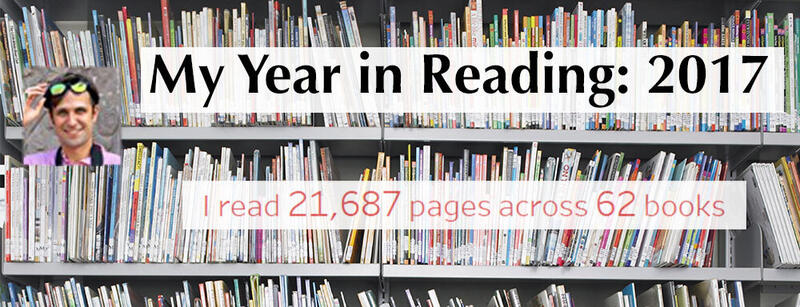
2017 was another great year of reading for me.
Numbers: I read 21,687 pages across 62 books and across 14 different genres. In terms of novels, I read mostly science-fiction, but I also added a few classics too. My non-fiction reading spanned a number of topics with a slight focus on science, business, technology, and history. My biggest month of reading was September 2017 in which I finished 10 books and 3672 pages.
One other topical reading highlight for 2017 was health and fitness, especially long-distance running. Along with completing two marathons and two half marathons, I read several great books on running and you have view my ratings and review in Science and Stories of Running and Some Great Books on Running.
Below is my data visualization of my year in reading, the top 5 books I read, and a few conclusions from this year and year to come.
Infographic: My Year in Reading Books
You can view the interactive infographic here: https://public.tableau.com/profile/mark.koester#!/vizhome/BookReading-YearinReview/2017YearinReading.
My Five Favorite Books from 2017:
Here are my top picks from this past year:
Favorite Book on Science and Technology:
The Inevitable by Kevin Kelly
My Takeaway: Major technological trends are changing our selves and societies in subtle ways. Kelly paints a portait of what tomorrow just might be like and how we can guide it.
Favorite Sci-Fi Novel:
The Three-Body Problem by Liu Cixin
My Takeaway: Epic sci-fi novel that takes us on a cosmic journey into the heart of being human and perhaps being a being.
Favorite Book on Entrepreneurship and Startups
Hot Seat: The Startup CEO Guidebook by Dan Shapiro
My Takeaway: Shapiro offers a candid yet practical look at becoming a Startup CEO at a high-tech, spectulative company. He offers tips and tales from the battles in building his own projects and becoming a leader therein.
Favorite Book on Entrepreneurship and Startups:
Grit by Angela Duckworth
My Takeaway: This book looks at how being ‘gritty’ helps us become great. It extends the research about having a “growth mindset” and “deliberate practice” can create so-called genius.
Favorite History Book:
No Ordinary Times by Doris Kearns Goodwin
My Takeaway: Few couples shaped history and American like FDR and Eleanor. Kearns Goodwins crafts a wonderful tale of the moments and relationships that shaped a marriage and a nation.
Conclusion: Books, Books and Books!
I managed to do a lot of reading in 2017. I got more and more into data visualization too, which lead me to create my own infographic on my year in reading. If you want to know how I created this visualization and other, checkout my post, How Do I Read?.
Considering how many work and personal projects I took on this past year, I was a bit surprised how much reading I did too. There are a couple reasons for this.
First, reading has become my default habit when I have nothing else better. Need a break or in-transit, I read. This ends up filling up a lot of time.
Second, I’ve gotten better and better at reading books I like and quitting books that I start but don’t like. I don’t feel pressured to read books just because I started them. I’ve also found that exposing myself to a range of books on different topics keeps me enthusiastic and engaged. I took up reading some philosophy books this year. While I studied philosophy in undergrad and graduate school, it’s been awhile since I’ve read philosophy for pleasure. It’s an area I plan to continue.
Third, I read a lot since for me it’s the best way to think and learn. While it’s easy to get sucked into current news and latest happenings, books remain the best source to go deep and wide on any and all topics. So as I continue to learn about technology, business, cultures and more, books are my main strategy to stay engaged and up-to-date. I often use articles to supplement but consume novels to primarily fuel any and all topics I’m interested in.
Like every year, I feel like there just isn’t enough time to read everything I want to read. Fortunately I’ve found Blinkist, which summarizes all of the great non-fiction books out there into 10-15 minute summary versions. I’ve been using Blinkist for about 2 years, and this method allows me to “read” another 60 to 100 books per year in an abbreviated form. I can explore a book’s main ideas or review a past book by reading or listening to the Blinkist summary.
What did you read and enjoy in 2017? Leave a comment and tell me!

